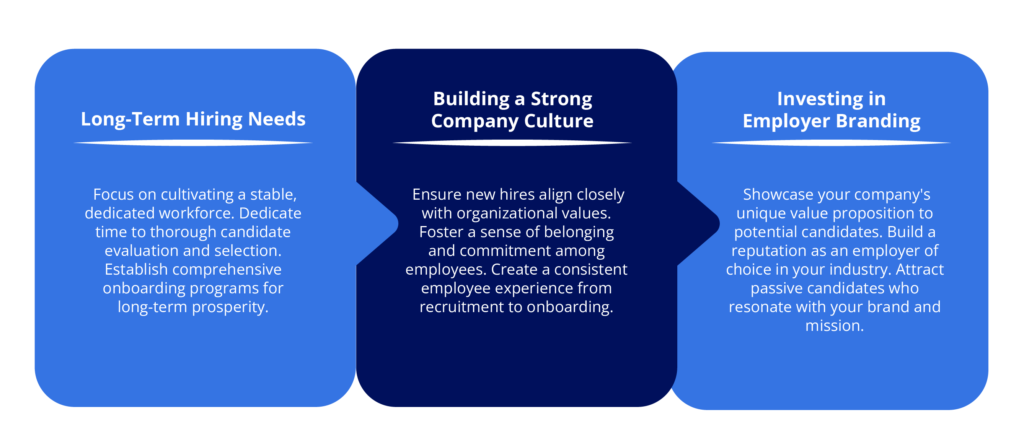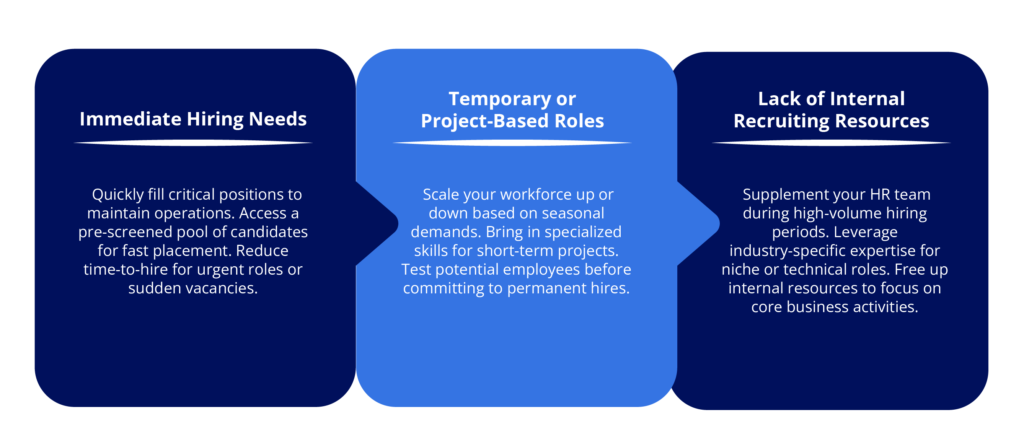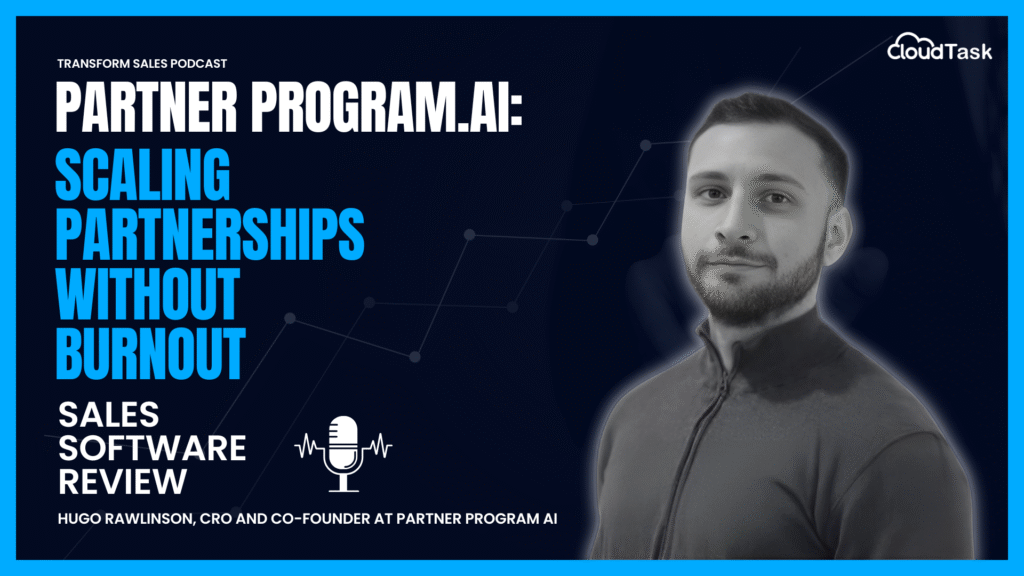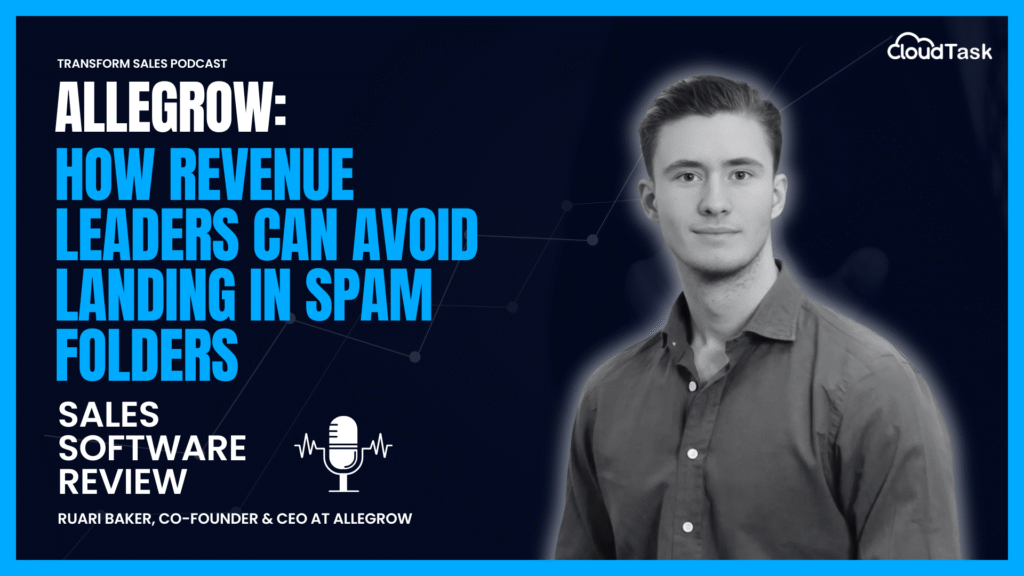Businesses face a critical decision when it comes to building their workforce: should they handle recruitment internally or partner with HR staffing companies?
This choice significantly impacts a company’s ability to attract top talent, manage costs, and maintain a strong organizational culture.
The consequences of choosing the wrong recruitment method can be severe. Companies may end up with ill-fitting hires, inflated costs, or lengthy vacancies that hinder productivity.
In this blog post, we’ll explore the distinct characteristics of direct recruiting and HR staffing companies, highlighting their advantages and disadvantages.
By the end, you’ll have a clear understanding of how each approach can impact your hiring process, helping you make the best choice for your organization.
What is Direct Recruiting?
Direct recruiting involves a company managing its entire hiring process in-house, from job posting to onboarding.
This method relies on internal HR teams or hiring managers to identify, attract, and evaluate potential candidates.
Companies using direct recruiting take full responsibility for every aspect of the hiring process, tailoring it to their specific needs and company culture.
Direct recruiting offers several compelling advantages:
- Tailored candidate selection: Companies can craft highly specific job descriptions and requirements, ensuring a close match between candidates and open positions.
- Stronger cultural fit: By managing the entire process, businesses can better assess how well potential hires align with their company values and work environment.
- Enhanced employer branding: Direct interaction with candidates throughout the hiring process allows companies to showcase their unique culture and benefits, potentially attracting higher-quality applicants.
However, direct recruiting also comes with certain drawbacks:
- Time-consuming process: Managing the entire recruitment cycle internally can be resource-intensive, potentially diverting attention from other critical business operations.
- Higher initial costs: Companies must invest in recruitment tools, job board subscriptions, and potentially dedicated HR staff to handle the hiring process effectively.
- Limited reach to passive candidates: Without extensive networks or resources, businesses may struggle to connect with qualified individuals who aren’t actively job hunting.
Key Differences Between Direct Recruiting and HR Staffing Companies
1. Recruitment Process
Direct recruiting involves a hands-on, personalized approach to hiring.
Internal teams manage every step of the process, from crafting job descriptions to conducting interviews and making final decisions.
HR staffing companies, on the other hand, offer a more standardized approach.
They handle the bulk of the recruitment process, presenting pre-screened candidates to the client company for final approval.
- Direct Recruiting:
- Customized job descriptions and requirements.
- In-depth candidate screening aligned with company-specific criteria.
- Direct communication with potential hires throughout the process.
- HR Staffing Companies:
- Standardized recruitment processes.
- Efficient candidate matching based on general qualifications.
- Limited client involvement until the final stages of hiring.
2. Cost Structure
The financial implications of each approach differ significantly, impacting both short-term budgets and long-term hiring costs.
Direct recruiting often involves higher upfront costs but can lead to savings over time. Companies must invest in recruitment tools, job board subscriptions, and potentially additional HR staff.
However, these costs can be offset by reduced turnover and better-fitting hires.
HR staffing companies typically operate on a pay-as-you-go model, charging fees based on successful placements or hours worked by temporary staff.
While this can provide more immediate flexibility, it may result in higher long-term expenses for permanent positions.
- Direct Recruiting:
- Initial investment in recruitment infrastructure.
- Ongoing costs for job postings and HR personnel.
- Potential long-term savings from reduced turnover.
- HR Staffing Companies:
- Fee structures based on placement success or hours worked.
- Minimal upfront costs.
- Potential for higher cumulative expenses for long-term or multiple hires.
What are HR Staffing Companies?
HR staffing companies serve as intermediaries between businesses and job seekers. These firms specialize in recruiting, screening, and sometimes even training candidates before placing them with client companies.
Staffing agencies can provide temporary workers, contract-to-hire employees, or permanent placements, depending on the client’s needs.
HR staffing companies offer several benefits to businesses:
- Access to a larger talent pool: Staffing firms typically maintain extensive databases of candidates and have established networks for reaching both active and passive job seekers.
- Quick hiring process: With pre-screened candidates and streamlined processes, staffing agencies can often fill positions faster than internal recruiting teams.
- Flexibility in workforce management: Companies can easily scale their workforce up or down based on seasonal demands or project needs without committing to permanent hires.
3. Quality of Candidates
The caliber of candidates can vary between these two approaches, each with its own strengths in attracting talent.
Direct recruiting allows companies to precisely define their ideal candidate and thoroughly assess each applicant’s fit with the organization’s culture and values.
This can lead to hires who are more likely to succeed and stay with the company long-term.
HR staffing companies offer access to a diverse pool of candidates, including those who might not respond to direct job postings.
However, the quality and fit of these candidates can vary, as staffing agencies may prioritize quick placements over perfect matches.
- Direct Recruiting:
- Highly targeted candidate searches.
- Thorough assessment of cultural fit and long-term potential.
- Opportunity to showcase unique company benefits and culture.
- HR Staffing Companies:
- Access to a wide range of candidates, including passive job seekers.
- Varied quality of applicants depending on agency standards.
- Limited ability to assess cultural fit beyond basic qualifications.
4. Time and Resources
The allocation of time and internal resources differs significantly between these two recruitment methods.
Direct recruiting requires a substantial commitment of time and effort from internal teams. HR staff or hiring managers must manage every aspect of the recruitment process, which can be time-consuming and potentially divert attention from other important tasks.
HR staffing companies can significantly reduce the time and resources a company needs to dedicate to hiring. By handling most of the recruitment process, these agencies allow businesses to focus on their core operations while still filling necessary positions.
- Direct Recruiting:
- Significant time investment from internal teams.
- Full control over the pace and thoroughness of the hiring process.
- Potential for delays in filling positions due to internal constraints.
- HR Staffing Companies:
- Minimal time required from client company until final hiring stages.
- Rapid filling of positions, especially for temporary or urgent needs.
- Reduced strain on internal resources during hiring periods.
5. Flexibility and Scalability
The ability to adapt to changing workforce needs is an important consideration when choosing between direct recruiting and HR staffing companies.
Direct recruiting is often best suited for stable, long-term hiring needs. It allows companies to build a consistent workforce aligned with their culture and goals.
However, scaling up quickly or managing temporary staffing needs can be challenging with this approach.
HR staffing companies excel in providing flexibility and scalability. They can quickly supply temporary workers for short-term projects, seasonal demands, or to fill gaps while searching for permanent employees.
This adaptability can be particularly valuable in industries with fluctuating workforce needs.
- Direct Recruiting:
- Ideal for building a stable, long-term workforce.
- Challenges in quickly scaling up or down.
- Better for companies with predictable hiring needs.
- HR Staffing Companies:
- Excellent for managing temporary or project-based staffing needs.
- Easy scaling of the workforce based on demand.
- Beneficial for industries with seasonal fluctuations or unpredictable growth.
Despite these advantages, working with HR staffing companies also has potential drawbacks:
- Potential mismatch with company culture: Staffing agencies may not fully grasp the nuances of a company’s culture, potentially leading to hires who don’t integrate well with the existing team.
- Less control over candidate selection: While companies can provide input, the initial screening and selection process is largely managed by the staffing agency.
- Possible higher long-term costs: Fees for staffing agency services can add up, especially for long-term or permanent placements.
When to Choose Direct Recruiting
Direct recruiting can be the optimal choice in several scenarios, particularly when long-term strategy and company culture are key considerations.
Understanding when to leverage this approach can significantly impact your organization’s growth and stability.
Here’s what you need to consider:

When to Choose HR Staffing Companies
HR staffing companies offer valuable solutions in specific situations, particularly when flexibility and speed are crucial.
Recognizing these scenarios can help you leverage staffing agencies effectively to meet your business needs.
Here’s what you need to consider:

Final Thoughts
Choosing between direct recruiting and HR staffing companies is a critical decision that can significantly impact your organization’s growth, culture, and bottom line.
Both approaches offer distinct advantages and challenges, and the right choice depends on your specific business needs and long-term goals.
Consider your company’s unique situation:
- Do you have the internal resources to manage a comprehensive recruitment process?
- Is cultural fit a critical factor in your hiring decisions?
- Do you need to quickly scale your workforce up or down?
- What is your budget for recruitment, both in the short and long term?
By carefully evaluating these factors, you can determine which approach – or perhaps a combination of both – will best serve your organization’s recruitment needs.
Struggling with the complexities of hiring for sales and RevOps roles? CloudTask offers the best of both worlds.
Our marketplace combines the personal touch of direct recruiting with the efficiency of staffing agencies.
Access a curated pool of top-tier, remote talent from Latin America and beyond, perfectly suited for your sales and RevOps needs. Cut costs, save time, and build a high-performing remote team without compromise.
Visit CloudTask Marketplace now and revolutionize your hiring process.








